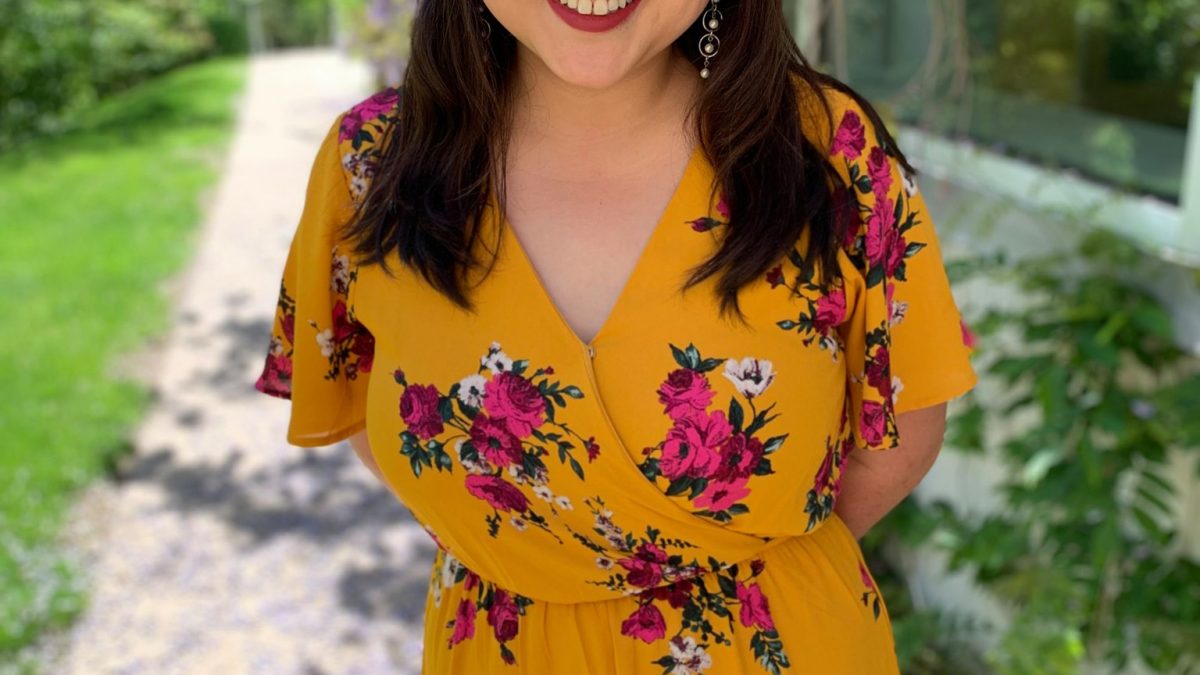
![]()
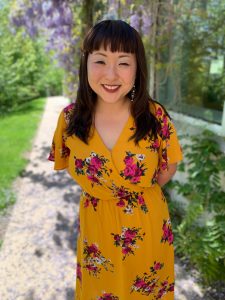

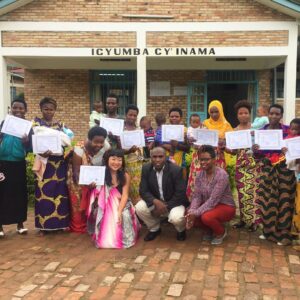
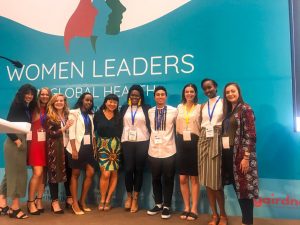
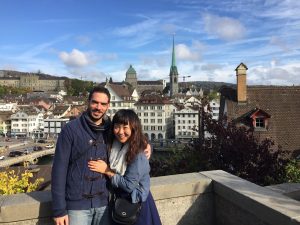
Chibo Shinagawa
Program Systems Coordinator,
Asian Women’s Shelter
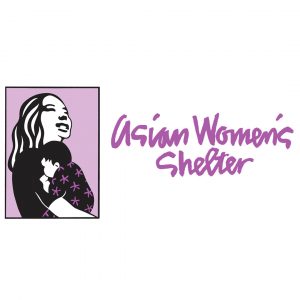
PROFILE:
Chibo Arhum Shinagawa was born in Berkeley, CA and raised in Ithaca, NY. She is the child of a Japanese American father and Korean American mother. Chibo is a reproductive justice activist, global health policy researcher, database analyst, and community organizer committed to the protection of Asian immigrant domestic violence survivors. Most recently, she worked in Rwanda on a Global Health Corps Fellowship. She joined Asian Women’s Shelter (AWS) in the San Francisco Bay Area as a Program Systems Coordinator in June 2020. Chibo loves photography, hiking and writing poetry.
What brought you to AWS and how did you decide to pursue your current career?
It starts with my background as someone who is multi-ethnic. Growing up, thanks to my parents, I attended both a Japanese temple and a Korean church and always felt a strong affinity for both cultures. This personal background, together with my academic training in sociology and in monitor-ing & evaluation (M&E) led me to work in the international nonprofit field — with the Peace Corps and in global health.
I became really passionate about evaluation and data analysis because I started to see the importance of evidence-based data in effectively supporting the community I was working with. After finishing my fellowship in Rwanda, given the Covid-19 situation, I decided to come back to the Bay Area to be closer to my family and partner. I had known about the Asian Women’s Shelter (AWS) for many years and see it as a unique organization that helps to empower and protect Asian immigrant survivors of domestic violence (DV).
Given my strong multi-ethnic identity, for the first time in my life, I wanted to work at an organization where I could work with and serve people that I could identify with as an Asian American. My mom’s life story as an immigrant was an inspiration to me, as was AWS’s philosophy and social justice-centered and trauma-informed approaches. Being a survivor of DV and of sexual assault myself was another motivation. Not only does the job use my data analysis and M&E skills, but this is an amazing organization whose work truly uplifts and supports our community.
Tell us about the Asian Women’s Shelter, its programs and services.
AWS offers a shelter for survivors of domestic violence, and we also provide case management support and resources for survivors including help with transitional housing, employment, legal services, etc. We also have a 24-hour crisis line and offer a multilingual access model where volunteers and language advocates support our survivors in 42 different languages. AWS has been around for 32 years (that’s as old as I am!), and some of my coworkers have been working there for the whole 32 years!
One of the programs I’m involved with at AWS is called K-PEACE, which stands for “Koreans for Preventing & Ending Abuse through Community Engagement.” There’s a team of volunteers and staff working on different ways to encourage dialogue about DV and raise awareness in the Korean American community in the Bay Area. We hope to break down the stigma around DV.
We just conducted a community survey and will continue getting input from the community through focus groups so we can develop programs that could start more conversations about DV and train people. Our goal is to reach out to Korean community members, especially those with limited English proficiency, in all forms of advocacy they need.
How has the Covid-19 pandemic affected AWS and its work?
Unfortunately, the pandemic has made things more difficult for DV survivors everywhere. Since the start of the pandemic, the number of calls we get on our crisis line has increased; we received nearly 900 calls so far and spent more than 300 hours supporting callers. We have also made many more referrals to other shelters compared to 2019, and it has become harder to arrange housing and employment opportunities for the survivors. Our team is trying to be creative given the restrictions, so we can continue to offer our programs and services to those in need.
How have you been affected, personally and professionally, by the pandemic?
Adjusting to life in the Covid-19 era is definitely challenging, especially starting a new job in a virtual setting. It also made me reassess my values and what I wanted to do in life. It came down to my mom, who continues to inspire me and be a role model of resiliency. I’m learning to appreciate my own environment at home, having more plants around, as well as going out for walks more often. As a survivor myself, and as someone who works in a field where I could be influenced vicariously by our survivors’ stories, I can’t emphasize enough the importance of self-care. In order to help others, I need to learn how to take good care of myself.
What does a typical workday look like?
My role as a Program Systems Coordinator is to support our program coordinators and advocates by helping to archive and manage all the data related to their work with survivors. The data is used for grant reporting to our funders, but also helps us assess our progress toward meeting goals and see how we can improve our programs.
I spend every day reviewing our database system to make sure all the data (both quantitative and qualitative) is consistent and valid. Another part of my job is to figure out how to build and uplift stories of our work, while making sure that the stories of individuals/survivors maintain strict confidentiality. I really love the storytelling part! Funders want to hear the stories behind the data, and I want to show why it’s important to support these programs at AWS and also why we need their continued support.
The one part of my work that I enjoy the most is getting to engage in diverse programs. Because I work with data that all of our program coordinators contribute to, I get to interact with different staff on a daily basis.
Tell us about any memorable moments from your work at AWS so far.
Since my work doesn’t involve direct contact with survivors, I really wanted to find a way to become engaged with the people I’m reporting on. The AWS Maintenance Coordinator suggested I could help clean the shelter’s kitchen. Thankfully, one thing that helps me de-stress is cleaning! I started going to the shelter every week to clean, and it allowed me to start conversations with the residents. I really love having this opportunity to engage with our clients.
Another thing I really love about AWS is how compassionate and kind the staff members are. Working there helps me learn how to build my compassion and empathy; I feel the culture encourages me to be a better person. Also, most of our staff are predominantly female-identified, and it is very powerful to work with so many strong Asian women, in addition to so many of my strong colleagues who identify as gender non-binary and non-conforming.
What are some specific AWS programs or projects you are currently working on?
K-PEACE is one of my favorite projects. Working on K-PEACE is not only a way to contribute to the Korean community, but also it makes me feel even closer to my mom. I love working with the other team members and trying to reduce the stigma around DV, and hopefully reduce DV itself within our community, is very rewarding work.
Another project I’m currently working on is related to developing a pre-ESL program to support our survivors. We’re working on a curriculum that can be used by our volunteers, and we’ll also provide a referral service to college ESL programs. My responsibility is to keep track of our project goals and objectives (as well as outreach) and to figure out what kind of skills and English needs our survivors might have. Learning English is important for survivors’ economic independence and helps them empower themselves.
What are some of the qualities you think are needed to enjoy and be successful working in nonprofits?
When I first started working at a nonprofit organization10 years ago, I valued serving others more than serving myself, and soon became burned out. So, it’s really important to take time for self-care as much as caring for others. And if there is one thing I learned from working in the nonprofit field, it is resiliency and understanding that it is okay to fail. It’s also important to be mindful that your values are aligned with the organization’s values and mission.
For those who are interested in working in this field (DV), I would say, follow your intuition and passion! Own your unique story and hold it close to your heart. It is going to be tough, but it will be incredibly rewarding. I’m so thankful for the opportunity to work with such kind and compassionate people, and to be a part of the community that I work for as a Korean and Japanese American.
What is one thing you would like the broader community to know about AWS and the work it does?
I would like people to know that there are organizations like AWS to support and provide resources and shelter to those affected by domestic violence. Especially if you witness DV or you are a survivor of domestic violence yourself, it’s important to have an open dialogue, even if the conversations are difficult. I would like those who are survivors to know that they are not alone, and that resources and community are within reach.
